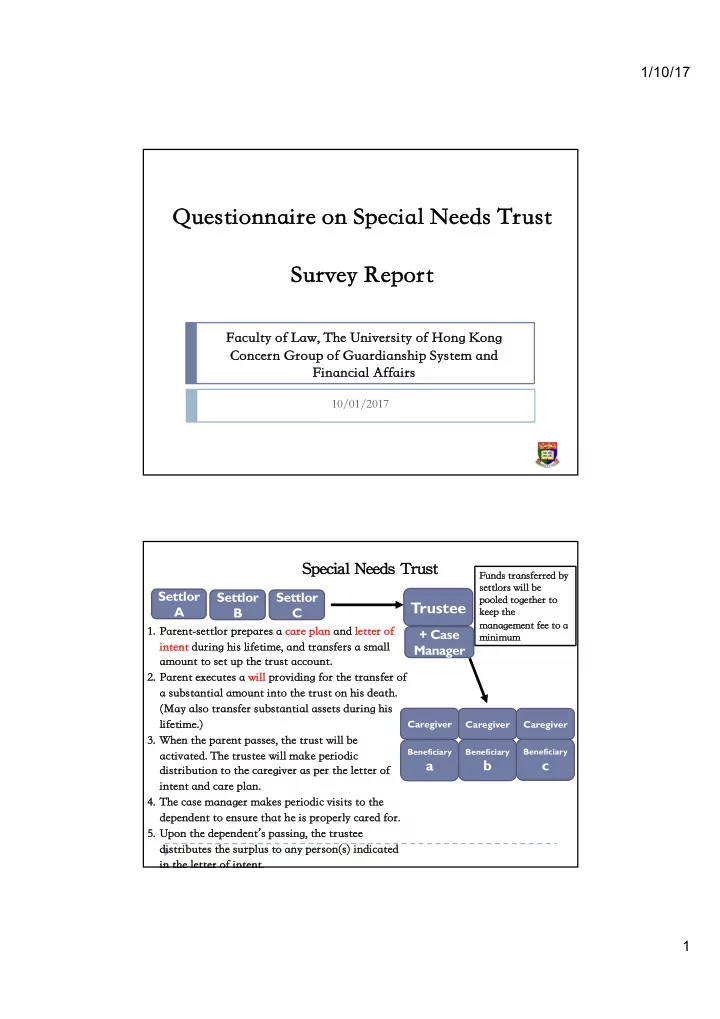

1/10/17 Questionnaire on Special Needs Trust Survey Report Faculty of Law, The University of Hong Kong Concern Group of Guardianship System and Financial Affairs 10/01/2017 Special Needs Trust Funds transferred by settlors will be Settlor Settlor Settlor pooled together to Trustee A B C keep the management fee to a 1. Parent-settlor prepares a care plan and letter of + Case minimum intent during his lifetime, and transfers a small Manager amount to set up the trust account. 2. Parent executes a will providing for the transfer of a substantial amount into the trust on his death. (May also transfer substantial assets during his lifetime.) Caregiver Caregiver Caregiver 3. When the parent passes, the trust will be Beneficiary Beneficiary Beneficiary activated. The trustee will make periodic a b c distribution to the caregiver as per the letter of intent and care plan. 4. The case manager makes periodic visits to the dependent to ensure that he is properly cared for. 5. Upon the dependent’s passing, the trustee distributes the surplus to any person(s) indicated in the letter of intent. 1
1/10/17 Survey Questionnaire } 2,513 respondents; March to May 2016 } Methods of statistical analysis } Main observations Respondents’ background information } Majority of respondents aged 30-59, taking care of dependents with mild or moderate intellectual disability aged 39 or below } More than 90% have not executed a will or set up an enduring power of attorney } More than half are unable to find a suitable guardian } Only 5% are able to set up a private trust (appointing a professional trustee at≥HK$50,000 p.a. or a gratuitous trustee) 2
1/10/17 Main Observations: (1) Parents’ expectations of the trustee Do parents trust the Government to act as trustee? 3% 16% 82% Yes No 5 3
1/10/17 If the Government does not act as trustee, which NGO do parents trust? 46% of parents would only trust a 52% Government trustee likely/very likely Remaining parents would also trust NGO trustee 42% 26% prefer a new charity accountable to the Government and formed by parent representatives and professionals 38% 11% prefer an existing well-known charity accountable to the Government 34% 5% prefer a new charity formed by parent representatives 18% 0.4% prefer a private financial institution 6 Recap: parents’ expectations of the trustee } Overwhelming preference for the Government to act as trustee } Two crucial factors to joining the SNT : } Government trusteeship or government supervision; } Parent and professional leadership in trust management 7 4
1/10/17 (2) Amount of service fee parents are prepared to pay If the Government does not act as trustee, amount of service fee parents are prepared to pay 51% Not prepared to pay service fee 35% Less than 1% p.a. of the managed assets 3% More than 2% p.a. of the managed assets 9 5
1/10/17 (3) Parents’ preferences on trust services Likelihood Services parents would like the SNT of joining to provide 58% Provision of a case manager to 53% likely/ monitor services in government- very likely subvented hostels 58% 50% Custody and disbursement of trust funds according to parents’ wishes 56% 43% Provision of a case manager to monitor the needs of dependents living in the community 59% 32% Investment of trust funds in a prudent way 11 6
1/10/17 Will respondents participate in an SNT with the above features and a Government trustee? 6% 22% 44% 29% Very likely / Likely Not Sure Very unlikely / Unlikely 12 SNT is most appealing to the following parents } Parents aged between 40-59; } Currently living with their dependents with intellectual disability; } Age of dependent is 39 or below; mild or moderate intellectual disability with a secondary disability; in receipt of disability allowance only or not in receipt of any social welfare benefits at all; } Prefer dependents to live on their own (and be looked after by professional staff / domestic helper) or in private or self-financed accommodation when parents pass away 13 7
Recommend
More recommend